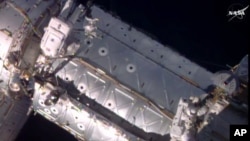Astronauts ventured out on a spacewalk Friday to install a new door for visitors at the International Space Station.
The two Americans, Jeffrey Williams and Kate Rubins, quickly began hooking up a docking port that will be used by future commercial crew capsules. SpaceX delivered this new gateway last month.
Americans haven't rocketed into orbit from their home turf since NASA's last shuttle flight in 2011. SpaceX and Boeing expect to resume human launches from Cape Canaveral in another year or two.
SpaceX is shooting for a launch of its supped-up Dragon with two astronauts as early as a year from now. Boeing is aiming for a two-person test flight of its Starliner capsule in early 2018. Until then, Russia will keep providing all the rides – at a hefty price for U.S. taxpayers.
NASA divested itself of cargo deliveries a few years back, hiring private U.S. companies to carry out shipments. Commercial crew launches will be an even bigger step. This commercial handoff is freeing up NASA to focus on true outer-space exploration; the space agency is working to get astronauts to Mars in the 2030s.
A repeat effort
This is actually NASA's second newfangled docking ring. The first was destroyed in a SpaceX launch accident last summer. NASA ultimately wants two of these 3 1/2-by-5-foot ports at the 250-mile-high lab. Another one, cobbled together from spare parts, should fly up in about a year.
The space station is currently home to two Americans, one Japanese and three Russians. Up there for five months, Williams and two of the Russians will return to Earth in a couple weeks. First, though, Williams will conduct one more spacewalk with Rubins on September 1 to retract a radiator.
Williams, a veteran spacewalker, was the first one through the hatch Friday morning. "Come on out,'' he urged Rubins.
"The view is phenomenal,'' Rubins marveled before getting straight to work.
Rubins is now part of an exclusive sorority: She is only the 11th American woman to conduct a spacewalk and the 12th woman in the world. The first professional virus-hunter in space, she has been experimenting with a DNA decoder that, along with this new docking port, arrived on a Dragon cargo capsule in mid-July.
Travel plans
SpaceX's crew Dragon – an enhanced version of its cargo ship – will fly from a former shuttle launch pad at Kennedy Space Center and, at mission's end, splash down off the Florida coast. Boeing's Starliner, meanwhile, will launch aboard the United Launch Alliance's trusty Atlas V rocket and parachute down somewhere in the American Southwest, possibly New Mexico. These test flights, intended to go all the way to the space station and dock, will last about two weeks.
NASA will provide most if not all of the initial test pilots.




